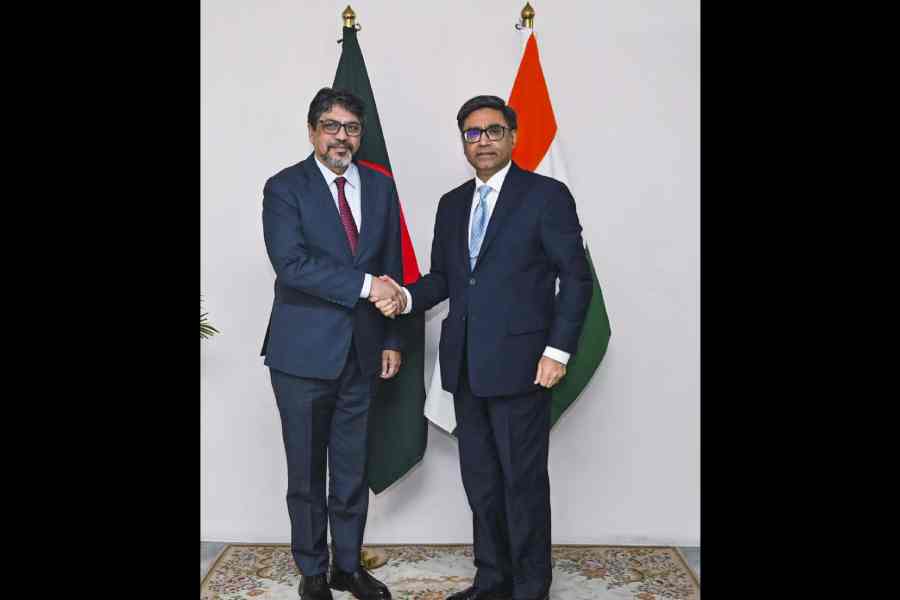Foreign secretary Vikram Misri on Monday underlined India’s desire to work closely with the Muhammad Yunus-led interim government in Dhaka before conveying New Delhi’s “concerns” about the safety of minorities in Bangladesh.
The message from Misri, articulated during Foreign Office Consultations (FOC) in Dhaka, signalled New Delhi’s intent to normalise a relationship that had nosedived amid the turmoil in Bangladesh following Sheikh Hasina’s ouster and arrival in India.
“I have underlined today India’s desire to work closely with the interim government of Bangladesh authorities. At the same time, we also had the opportunity to discuss certain recent developments and issues, and I conveyed our concerns including those related to the safety and welfare of minorities,” a statement Misri issued after talks with his counterpart Jashim Uddin said.
During his daylong trip, the Indian foreign secretary called on Yunus and his foreign affairs adviser, Touhid Hossain, holding separate but brief meetings with them.
Misri’s measured statement, with its reference to the “safety and welfare of minorities” towards the end, marked a sharp contrast with BJP leaders’ shrill pitch in India about “attacks on Hindus” in Bangladesh.
There is a context to this that cannot be ignored or set aside. The Modi government’s espousal of Hindutva and its ideological and political hostility towards India’s largest minority community is rampant and a matter of record. The regime cannot be seen lecturing others on minority issues, especially at a time when questions have been legitimately raised about the treatment of minorities in India.
The spate of recent attempts by the Hindutva family to take over Muslim religious sites on the plea that they were established by demolishing temples has not gone unnoticed, especially in the neighbourhood. Attacks on Muslims have been reported even recently from Madhya Pradesh and Haryana.
Bangladeshi media reported that Yunus had described the bilateral ties as “very solid” and “close” at his meeting with Misri, and asked India to clear the “clouds” over the relationship in recent times. He reportedly broached Hasina’s stay in India and its impact on the relationship.
“Our people are concerned because she is making many statements from there. It creates tensions,” he reportedly told Misri.
In its formal statement on the FOC, Bangladesh echoed India and expressed hope about advancing the relationship. But some comments from Dhaka hinted at the regime’s continued belligerence towards India.
Jashim Uddin told a news conference that Dhaka had asked New Delhi not to interfere in its internal affairs, signalling reservations about India’s comments on the arrest of Hindu monk Chinmoy Krishna Das and the safety of minorities in Bangladesh.
“We said people of all religions in Bangladesh freely practise their faiths. This is our internal affair. It is not expected (of other countries) to make comments on our internal affairs. We don’t do it for other countries,” he said.
India’s external affairs ministry recently issued statements on Das’s arrest and continued imprisonment. This was followed by demonstrations in India demanding the monk’s release and protesting the alleged attacks on Hindus in Bangladesh.
A foreign ministry statement from Dhaka said the Bangladeshi side had at the FOC referred to the “misinformation” spread by the Indian media about the developments in Bangladesh and sought the Indian government’s intervention.
While some Indian media outlets had gone overboard on the subject of attacks on Hindus in Bangladesh, there’s no denying the palpable fear among the minorities since Hasina’s ouster.
The interim government has repeatedly promised to protect minority rights but done little to build confidence among the Hindus, Christians and Buddhists, who are 10 per cent of the country’s population.
A source in the Yunusregime told this newspaper that Jashim Uddin’s comments were prompted by Dhaka’s ire at Misri’s stress on the safety of minorities. “Compared with previous FOCs, the atmosphere was unusually cold,” the source said.
The two foreign secretaries had met behind closed doors, accompanied by two senior colleagues each, before the FOC to discuss thorny issues.
“The Bangladeshi side brought up Hasina’s virtual addresses from her Indian hideout (she recently delivered two addresses to her supporters in America and Britain) and objected to the way she was trying to create instability with hate speeches,” the source said.
Several key members of the interim government have demanded the extradition of Hasina, implicated in over 250 cases.
Other prickly issues such as alleged killings of Bangladeshis by the BSF on the border, Indian politicians’ comments on the Bangladesh situation, Indian visa restrictions and the sudden fall in trade volume too came up at the closed-door session.
An observer in India said the “lack of trust” — a phrase used by Jashim Uddin at a news conference in the evening — was likely to continue for some time. He referred to a meeting between Yunus and European envoys.
“The chief adviser urged the EU envoys to shift their visa processing centres from Delhi to Dhaka or any other country on a day India’s foreign secretary was visiting Bangladesh,” the observer said.
Yunus told the envoys that Bangladeshi students, who had to travel to India to seek visas from several EU countries, were affected because of India’s visa restrictions.
“This is direct aggression.... Knowing well the EU countries cannot do it, Yunus came up with a suggestion like this. Somehow, I don’t see Bangladesh trying to normalise things,” the observer said. “The Indian side delivered a balanced message but the fact is, it was not reciprocated.”











